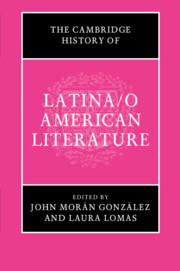Book contents
- The Cambridge History of Latina/o American Literature
- The Cambridge History of Latina/o American Literature
- Copyright page
- Dedication
- Contents
- Contributors
- Acknowledgements
- Chronology
- Introduction
- Part I Rereading the Colonial Archive
- Part II The Roots and Routes of Latina/o Literature
- 6 Whither Latinidad?
- 7 Father Félix Varela and the Emergence of an Organized Latina/o Minority in Early Nineteenth-Century New York City
- 8 Transamerican New Orleans
- 9 Trajectories of ExChange
- 10 Narratives of Displacement in Places that Once Were Mexican
- 11 Under the Skin of Latina Feminism and Racism
- 12 José Martí, Comparative Critique, and the Emergence of Latina/o Modernity in Gilded Age New York
- 13 Afro-Latinidad
- Part III Negotiating Literary Modernity
- Part IV Literary Migrations across the Americas, 1980–2017
- Epilogue
- Bibliography
- Index
- References
7 - Father Félix Varela and the Emergence of an Organized Latina/o Minority in Early Nineteenth-Century New York City
from Part II - The Roots and Routes of Latina/o Literature
Published online by Cambridge University Press: 16 February 2018
- The Cambridge History of Latina/o American Literature
- The Cambridge History of Latina/o American Literature
- Copyright page
- Dedication
- Contents
- Contributors
- Acknowledgements
- Chronology
- Introduction
- Part I Rereading the Colonial Archive
- Part II The Roots and Routes of Latina/o Literature
- 6 Whither Latinidad?
- 7 Father Félix Varela and the Emergence of an Organized Latina/o Minority in Early Nineteenth-Century New York City
- 8 Transamerican New Orleans
- 9 Trajectories of ExChange
- 10 Narratives of Displacement in Places that Once Were Mexican
- 11 Under the Skin of Latina Feminism and Racism
- 12 José Martí, Comparative Critique, and the Emergence of Latina/o Modernity in Gilded Age New York
- 13 Afro-Latinidad
- Part III Negotiating Literary Modernity
- Part IV Literary Migrations across the Americas, 1980–2017
- Epilogue
- Bibliography
- Index
- References
Summary
- Type
- Chapter
- Information
- The Cambridge History of Latina/o American Literature , pp. 157 - 175Publisher: Cambridge University PressPrint publication year: 2018



